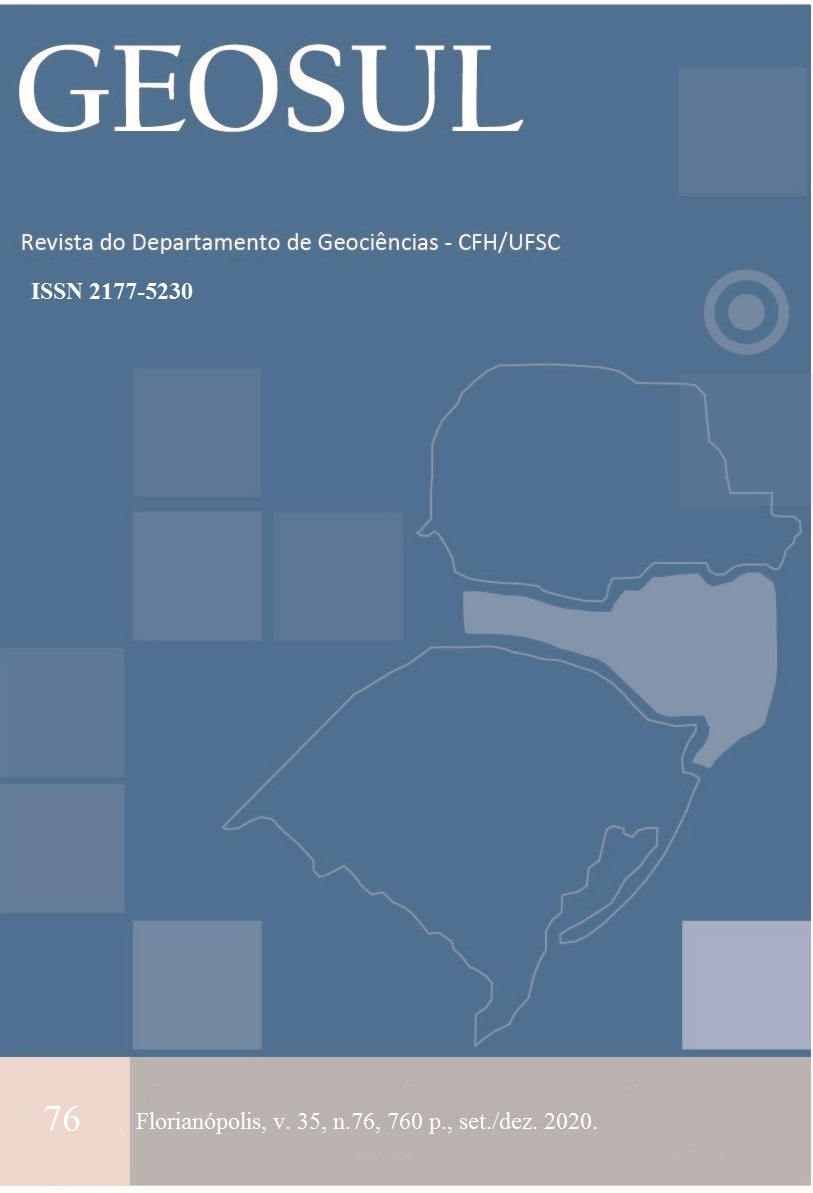Diferencial de rendimentos entre empregadores e assalariados: uma análise para a região Sul do Brasil
DOI:
https://doi.org/10.5007/2177-5230.2020v35n76p536Resumo
O objetivo deste estudo é analisar o diferencial de rendimentos dos empreendedores e assalariados na região Sul do Brasil, tendo em vista a importância desse assunto para que se possam realizar políticas públicas eficientes em relação aos incentivos ao empreendedorismo. Para isso, utiliza-se a base de dados da Pesquisa Nacional de Amostras por Domicílios (PNAD-2015) do Instituto Brasileiro de Geografia e Estatística (IBGE). O método utilizado consiste em um modelo probabilístico com distribuição normal (probit) bem como um modelo para a correção do viés de seleção (heckit). Por fim, os resultados apontam que o empreendedor da região Sul aufere, em média, remuneração maior que um indivíduo aleatoriamente distribuído na amostra.
Referências
ACS, Z.; ARMINGTON, C. Employment Growth and Entrepreneurial Activity in Cities. Regional Studies, v. 38, n. 8, p. 911–927, nov. 2004.
ACS, Z. J.; BOSMA, N.; STERNBERG, R. The entrepreneurial advantage of world cities: evidence from global entrepreneurship monitor data. Jena economic research papers, 2008.
AUDRETSCH, D. B.; THURIK, A. R. Capitalism and democracy in the 21st century: from the managed to the entrepreneurial economy. In: Mueller D.C., Cantner U. (eds) Capitalism and Democracy in the 21st Century. Physica, Heidelberg, 2001.
BLANCHFLOWER, D. G.; OSWALD, A. J. What Makes an Entrepreneur?. Journal of Labor Economics, 1998.
BOCK, J. H.; WAGNER, M. Necessity and Opportunity Entrepreneurs in Germany: Characteristics and Earnings Differentials. Schmalenbach Business Review. Vol 62, 2, p. 154-174, 2010.
BORJAS, G. J.; BRONARS, S. Consumer discrimination and self-employment. The Journal of political economy, 1989.
IBGE. Instituto Brasileiro de Geografia e Estatística. Disponível em: https://www.ibge.gov.br. Acesso em: 23, fevereiro, 2019.
CAMARGO NETO, R.; BARBOSA, M.; QUEIROZ, V. S.; MENEZES, G. Condicionantes do Empreendedorismo no Brasil: uma análise regional. Revista Brasileira de Estudos Regionais e Urbanos (RBERU), v. 11, n. 4, p. 20, 2017.
CARREE, M.; THURIK, R. Understanding the role of entrepreneurship for economic growth. The Handbook of Entrepreneurship and Economic Growth, Cheltenham, Elgar, ix-xix, 2005.
CLARK, K.; DRINKWATER, S. Ethnicity and Self-Employment in Britain. Oxford Bulletin of Economics and Statistics, v. 60, n. 3, p. 383–407, 1 ago. 1998.
CROMIE, S. Similarities and Differences between Women and Men Business Proprietorship. International Small Business Journal, 5(3), 43–60, 1987.
DE ALMEIDA, F. M.; SEDIYAMA, G. A. S.; SANTIAGO, F. A. A Contribuição do Empreendedorismo para o Crescimento Econômico dos Estados Brasileiros. Enaber, 2015.
FRITSCH, M.; MUELLER, P. The effect of new business formation on regional development over time: the case of Germany. Small Business Economics, v. 30, n. 1, p. 15–29, 26 nov. 2007.
GREENE, W. H. Econometric Analysis. 7th ed. Ed. Pearson, 2012.
HECKMAN, J. J. Sample Selection Bias as a Specification Error. Econometrica, v. 47, n. 1, p. 153–161, 1979.
HUBER, L. R.; SLOOF, R.; VAN PRAAG, M. The effect of early entrepreneurship education: Evidence from a randomized field experiment. IZA Discussion Papers 6512, Institute for the Study of Labor (IZA), 2012.
JIMÉNEZ, A.; PALMERO-CÁMARA, C.; GONZÁLEZ-SANTOS, M.; GONZÁLEZ-BERNAL, J; JIMÉNEZ-EGUIZÁBAL, J. The impact of educational levels on formal and informal entrepreneurship. BRQ Business Research Quarterly, v. 18, n. 3, p. 204–212, jul. 2015.
KASSOUF, A. L. The Wage Rate Estimation Using the Heckman Procedure. Brazilian Review of Econometrics, v. 14, n. 1, p. 89, 1 abr. 1994.
LAZEAR, E. P. Entrepreneurship. Journal of Labor Economics, Volume 23, Number 4, 2005.
LEE, L.-F. Generalized Econometric Models with Selectivity. Econometrica, v. 51, n. 2, p. 507–512, 1983.
LORZ, M. The impact of entrepreneurship education on entrepreneurial intention. Dissertation Doctor — Germany: University of St. Gallen, 2011.
MADDALA, G. S. Chapter 28 Disequilibrium, self-selection, and switching models. In: Handbook of Econometrics. Elsevier, v. 3p. 1633–1688, 1986.
MENEZES, G.; DOS SANTOS QUEIROZ, V.; FEIJO, F. T. Determinantes do Empreendedorismo no Brasil: uma análise da escolha ocupacional e dos rendimentos. ENABER, 2015.
MINCER, J. Education, income, and human behavior. NBER. New York: McGraw-Hill, p 71 -94, 1974.
OOSTERBEEK, H.; VAN PRAAG, M.; IJSSELSTEIN, A. The impact of entrepreneurship education on entrepreneurship skills and motivation. European Economic Review, v. 54, n. 3, p. 442–454, abr. 2010.
PARKER, S. C. The economics of entrepreneurship. Cambridge, UK ; New York: Cambridge University Press, 2009.
PRAAG, C. M. V.; VERSLOOT, P. H. What is the Value of entrepreneurship? A Review of Recent Research. n. IZA DP No. 3014, p. 43, 2007.
REES, H.; SHAH, A. An empirical analysis of self-employment in the UK. Journal of applied econometrics, v. 1, n. 1, p. 95–108, 1986.
TAMVADA, V. J. P. Entrepreneurship and Economic Development. Essays on Entrepreneurship and Economic Development. Tese de doutorado — New Delhi: der Universität Göttingen, 2007.
TAYLOR, M. P. Earnings, Independence or Unemployment: Why become self‐employed? Oxford Bulletin of Economics and Statistics, v. 58, n. 2, p. 253–266, 1 maio 1996.
WELSCH, H.; YOUNG, E. Male and Female Entrepreneurial Characteristics and Behaviours: A Profile of Similarities and Differences. International Small Business Journal, vol 2, issue 4, p 11-20, 1984.
WIT, G. D.; WINDER, F. A. A. M. V. An empirical analysis of self-employment in the Netherlands - Springer. Small Business Economics, v. Volume 1, Issue 4, pp 263–272, 1989.
Downloads
Publicado
Edição
Seção
Licença

Este trabalho está licenciado com uma Licença Creative Commons - Atribuição 4.0 Internacional.





